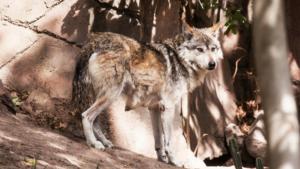Online Messenger #235
(view with pictures, as displayed in email)
A Scientific Paper Released Yesterday was Frank in its Recommendations that Livestock Grazing on Public Lands Should be Curtailed in the Context of Managing for Ecosystem Resilience Under Climate Stress.
The report, written by a team of scientists from around the west, included the following observations:
- Climate change is expected to intensify in the western U.S., even if greenhouse gas emissions are dramatically reduced;
- Climate change is causing the spread of invasive species, elevated wildfire occurrence, and declining snowpack;
- Federal land managers (on BLM and Forest Service public lands) have begun to adapt to and plan for to climate-related impacts, but have thus far not consider the interrelated impacts of climate and grazing mammals.
- Climate impacts are compounded from heavy use by livestock and other grazing ungulates, which cause soil erosion, compaction, and dust generation; stream degradation; higher water temperatures and pollution; loss of habitat for fish, birds and amphibians; and desertification.
- Encroachment of woody shrubs at the expense of native grasses and other plants can occur in grazed areas, affecting pollinators, birds, small mammals and other native wildlife.
- Livestock grazing and trampling degrades soil fertility, stability and hydrology, and makes it vulnerable to wind erosion. This reduces the capacity of soils to sequester carbon and through various processes, contributes to greenhouse warming. It also contributes sediments, nutrients and pathogens to western streams.
- Water developments and diversion for livestock can reduce streamflows and increase water temperatures, degrading habitat for fish and aquatic invertebrates.
- Domestic livestock now use more than 70 percent of the lands managed by the BLM and Forest Service, and their grazing may be the major factor negatively affecting wildlife in 11 western states.
- Removing or significantly reducing grazing is likely to be far more effective, in cost and success, than piecemeal approaches to address some of these concerns in isolation.
Western Watersheds Project certainly agrees! As our supporters know, we’ve been advocating for the same thing for twenty years, by continually raising the issue of ecosystem integrity and the need to improve public lands habitats for native species– not livestock. Whether it is water quality or wolf recovery, we’ve been pushing the agencies to recognize the undue influence of livestock operations.
In fact, Western Watersheds Project is the only environmental organization with full-time staff dedicated to improving ecosystem resilience and watershed health by ending public lands ranching. It’s true. Where other organizations have tailored their mission or take a more nuanced approach, Western Watersheds Project has not backed down from this politically tricky topic. We have stayed to fight, because the land and species need us.
And we need you. Please consider a generous donation to Western Watersheds Project today, and help keep our dedicated crew of biologists, ecologists, and activists working to remove the added stress of livestock grazing from our warming landscape.
Thanks and congratulations go to R. L. Beschta, D.L. Donahue, D.A. DellaSala, J.J. Rhodes, J.R. Karr, M.H. O’Brien, T.L. Fleischner, and C. Deacon Williams for this report. We’ll be helping to ensure that the land management agencies don’t hear the end of it for a long time !
WWP Win in California!
In a recent example of WWP’s success on reforming livestock grazing, and after a protracted legal challenge, on November 9, 2012 Judge Phyllis Hamilton signed off an agreement between the Forest Service and Western Watersheds Project and a coalition of environmental organizations that ensures that the Forest Service will conduct a full environmental review for grazing permits on 35 allotments in California, on the Mendocino, Klamath, Lassen, Plumas, Los Padres, Sequoia, and Stanislaus National Forests.
The Forest Service had claimed that its issuance of these grazing permits was “categorically excluded” from environmental review because of a legislative rider that was tagged onto the 2006 appropriations bill. The rider had allowed the Forest Service to categorically exclude grazing permits from NEPA if the permit continued current grazing management, if monitoring indicated that current grazing management was meeting management plan objectives, and if there were no “extraordinary circumstances.” We demonstrated that each of these allotments has extraordinary circumstances, and the agency was forced to withdraw its flawed decisions.
We are especially pleased that the Lassen National Forest will be taking a hard look at grazing allotments that include reaches of Pine Creek that provides the main spawning area for Eagle Lake Rainbow Trout which is currently being considered for ESA listing. These allotments have also been used by OR-7, California’s celebrated grey wolf.
Our thanks go to Lauren Rule of Advocates for the West, and Warren Braunig and Jeff Chanin of Keker & Van Nest, LLP who represented Western Watersheds Project and a coalition of other organizations in this case. And congratulations to Dr. Mike Connor, WWP’s California Director, for pursuing full and fair review on these special lands.






